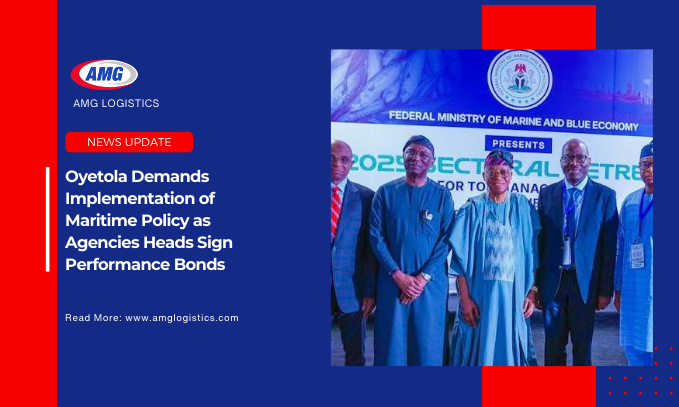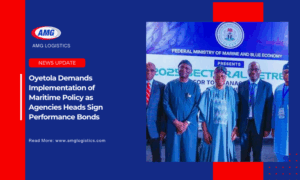In a bid to instill a result-driven culture across the Marine and Blue Economy sector, the Minister, Adegboyega Oyetola has charged senior officials of the Ministry and its agencies to deliver concrete outcomes in line with the newly approved National Policy on Marine and Blue Economy.
Speaking at the 2025 Sectoral Retreat held on Tuesday in Abuja, the Minister declared that with the policy framework now in place, the era of business-as-usual was over. He stressed that leadership across the Ministry must be guided by discipline, transparency, and urgency in translating strategy into impact.
“Performance Bonds signed here today must go beyond paper,” Oyetola said. “They are commitments to measurable progress—improved port efficiency, enhanced regulatory compliance, job creation, increased throughput, and revenue growth. These are the standards by which we will now be measured.”
The retreat, themed around reflection and realignment, brought together Directors, Heads of Agencies, and key technical stakeholders to chart a clear path for the full implementation of the Marine and Blue Economy Policy—recently approved by the Federal Executive Council. The Minister underscored that the sector plays a pivotal role in achieving the Federal Government’s Renewed Hope Agenda and must rise to its responsibilities.
He pointed to recent strides in port infrastructure upgrades, the implementation of the National Single Window, improved port efficiency, maritime security enhancements, progress in aquaculture, and the long-awaited commencement of the Cabotage Vessel Financing Fund (CVFF) disbursement process.
He described the recent approval of the National Policy on Marine and Blue Economy by the Federal Executive Council as a landmark achievement, setting the tone for the transformation of the sector.
With the policy now in place, Oyetola stressed that the focus must shift to execution. He tasked all agency heads to internalise the policy’s strategic goals and translate them into practical, measurable initiatives. He called for improved inter-agency coordination, greater transparency, technological adoption, and environmental responsibility, noting that these are critical to ensuring institutional performance and sector-wide transformation.
On the international front, Oyetola reiterated Nigeria’s commitment to securing a Category ‘C’ seat on the International Maritime Organization (IMO) Council. He said the bid represents a key foreign policy objective, and that while the Ministry would lead diplomatic engagements, agencies must also play active roles in projecting Nigeria’s maritime credentials to the global community.
In his remarks, the Permanent Secretary of the Ministry, Mr. Olufemi Oloruntola, echoed the Minister’s message, stressing that the Ministry stands at a critical juncture in the implementation of the Renewed Hope Agenda. He acknowledged the progress made under Oyetola’s leadership, particularly the successful approval of the national policy, but insisted that focus must now shift from policy development to results-driven implementation.
Oloruntola described the retreat as a vital platform for addressing bottlenecks, deepening synergy among agencies, and mapping out clear action plans to position the Marine and Blue Economy as a central pillar of Nigeria’s economic future. He said the Performance Bonds signed by agency heads are linked to clearly defined Key Performance Indicators (KPIs) and reflect a collective pledge to institutional accountability and service excellence.
He praised the agencies for embracing the renewed focus on results and called for sustained collaboration between the Ministry’s leadership and its agencies to ensure policy direction is backed by execution. He further acknowledged the strategic oversight provided by the National Assembly Committees on Marine Transport and Maritime Safety, commending the leadership of Senator Wasiu Eshinlokun and Hon. Khadija Bukar Abba Ibrahim for their support and legislative backing.
Oloruntola concluded by expressing appreciation for Minister Oyetola’s vision and resolve, which he described as instrumental in shaping the Ministry’s direction and galvanising its workforce toward performance and impact.





